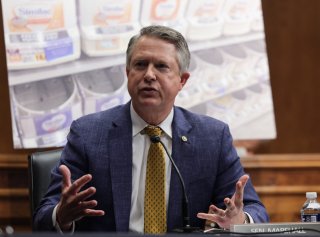FDA Chief: Baby Formula Shortage Could End in Two Months
Dr. Robert Califf, the commissioner of the FDA, told lawmakers on Thursday that he expects to see a full inventory of baby formula on store shelves across the country beginning in July.
Dr. Robert Califf, the commissioner of the Food and Drug Administration (FDA), told lawmakers on Thursday that he expects to see a full inventory of baby formula on store shelves across the country beginning in July.
“It’s going to be gradual improvement up to probably somewhere around two months until the shelves are replete again,” he stated in his testimony before the Senate Health, Education, Labor and Pensions Committee.
As reported by CNBC, Abbott plans to resume production at its plant in Sturgis, Michigan, on June 4 and will begin shipping out its specialty formula EleCare on June 20. The facility was shuttered in February after it was found to have bacterial contamination.
“We knew that ceasing plant operations would create supply problems, but we had no choice given the unsanitary conditions,” Califf told the lawmakers.
“You can’t just open a plant with bacteria growing in it. Would you go in a kitchen next door if there was bacteria growing all over the place and standing water and people tromping through with mud on their feet?” he continued.
Abbott boasts roughly a 40 percent share of the U.S. baby formula market, with the Michigan facility being responsible for 40 percent of the company’s U.S. production.
The company had previously stated that it would take six to eight weeks for its formula to arrive in stores once production restarts.
The FDA has also eased import restrictions, enabling foreign manufacturers to send baby formula to the United States. This comes on the heels of President Joe Biden’s announcement that he was invoking the Defense Production Act to increase baby formula manufacturing. The president is requiring suppliers to direct ingredients to baby formula manufacturers before any other companies who may have placed orders for those same goods.
In addition, the Health and Human Services Department and Department of Agriculture are being directed to use aircraft from the Defense Department to pick up and transport infant formula from abroad that meets U.S. health and safety standards. The Defense Department already has airlifted the equivalent of 1.5 million bottles of formula from Europe.
Meanwhile, the House has passed two bills aimed at addressing the baby formula shortage. The main piece of legislation, sponsored by Rep. Rosa DeLauro (D-CT), would provide $28 million in emergency funding to the FDA to help it streamline inspections of formula made at plants overseas and to protect against any future shortages.
“The FDA plays a critical role in ensuring formula provides the full nutritional needs of infants and that it is manufactured in the safest way possible. We must ensure that a lack of funding is not a barrier to getting safe formula to parents and babies. The bill before us does just that,” DeLauro said on the House floor.
“In the wealthiest nation in the world, babies should not be at risk of going hungry. Parents should not have to play a guessing game and wonder if the food that they are giving their babies is safe,” she added.
The other bill, sponsored by Rep. Jahana Hayes (D-CT), would allow more formulas to be purchased with benefits under the Special Supplemental Nutrition Program for Women, Infants and Children.
Ethen Kim Lieser is a Washington state-based Finance and Tech Editor who has held posts at Google, The Korea Herald, Lincoln Journal Star, AsianWeek, and Arirang TV. Follow or contact him on LinkedIn.
Image: Reuters.

